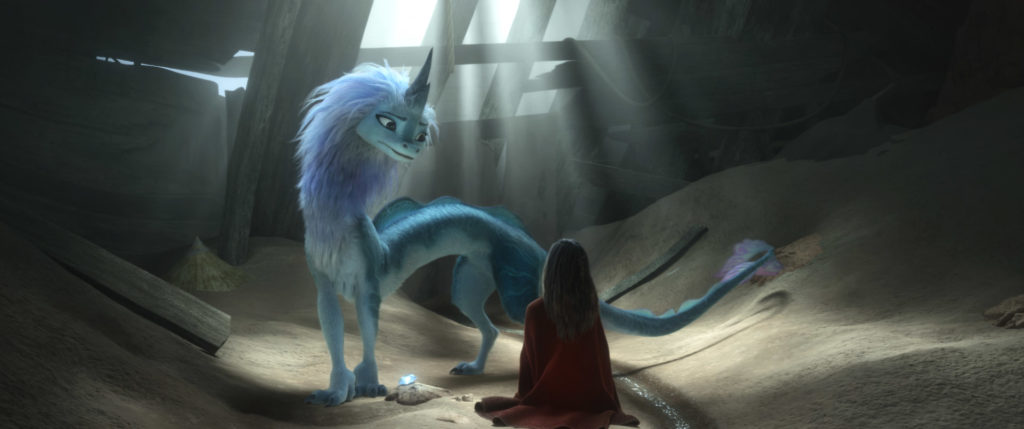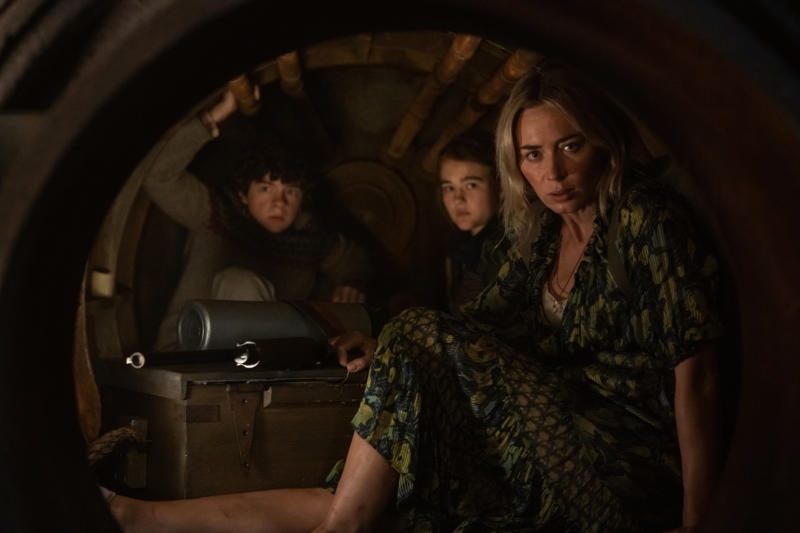By Daniel Loria and Rebecca Pahle
The economic impact of the Covid-19 pandemic has wreaked havoc across the entertainment industry, cinemas being among the most damaged sectors. Studios scrambled to develop new distribution plans for their 2020 slate as movie theaters around the world began to suspend operations without a return date in sight. The resulting shift in strategies led to a pivotal restructuring of theatrical distribution, with the future—and duration—of an exclusivity window up in the air as cinemas look for a financial recovery in 2021.
Universal
Universal was arguably the studio most directly affected by the initial pause on theatrical business back in March, having several titles disrupted early into their respective theatrical runs.
A handful of films––The Photograph (February 14), The Invisible Man (February 28), Emma. (March 6 expansion), Never Rarely Sometimes Always (March 13), and The Hunt (March 13)––went to the home in an earlier-than-usual Premium Video on Demand (PVOD) window, alongside Disney Pixar’s Onward and Sony’s Bloodshot, at the onset of the Covid-19 pandemic in the United States. The move was not met with any particular resistance from the exhibition community, which at the time had voluntarily shuttered nationwide.
By April, however, the studio fired the first shots in the current battle over windows: Trolls: World Tour, previously scheduled for April 10, abandoned plans for a theatrical release in favor of a PVOD debut. The animated sequel, priced at $19.99 for a digital rental, earned over $100 million in its first three weeks at home, according to the studio. NBCUniversal CEO Jeff Shell caused an uproar after telling the Wall Street Journal that Universal would explore a similar strategy for titles moving forward.
The response from leading exhibitors was swift. AMC Theatres CEO Adam Aron penned an open letter to Universal chairman Donna Langley, stating his circuit would not book any Universal titles under such a model. Regal parent company Cineworld followed suit with a similar reaction, reflecting a shared commitment to the existing theatrical exclusivity models.
“AMC is not afraid of change,” said Aron in a call with investors in August. “Instead, we believe that we are forcing that inevitable change to bend in ways that will serve AMC well and benefit AMC shareholders as a result.”
Universal’s shortened window structure was refined in November once Cinemark signed on, establishing a $50 million opening weekend cutoff for titles that would exclusively play in theaters for a period of 31-days (5 weekends) before their home debut. Canada’s Cineworld entered into the same agreement days later.
Cineworld, parent company of Regal, the second-largest circuit in North America, has been the only notable holdout among major players with a presence in the domestic market. The company’s decision to suspend operations in its U.K. and U.S. circuits came in October, hours after upcoming James Bond title No Time to Die, distributed internationally by Universal, was rescheduled to spring 2021.

New Titles Released Theatrically Since April 2020
The Way I See It –– September 18 (Focus Features)
Opening Weekend: $25k
Domestic Total: $49k
Kajillionaire -–– September 25 (Focus Features)
Opening Weekend: $215k
Domestic Total: $531k
Come Play –– October 30 (Focus Features)
Opening Weekend: $3.12M
Domestic Total: $9.22M
Let Him Go –– November 6 (Focus Features)
Opening Weekend: $4M
Domestic Total: $9.22M
Freaky –– November 13
Opening Weekend: $3.6M
Domestic Total: $8.78M
The Croods: A New Age –– November 25
Opening Weekend: $9.72M
Domestic Total: $35M
All My Life –– December 4
Opening Weekend: $370k
Domestic Total: $913k
Half Brothers –– December 4 (Focus Features)
Opening Weekend: $700k
Domestic Total: $2M
Promising Young Woman –– December 25 (Focus Features)
Opening Weekend: $719k
Domestic Total: $2.15M
News of the World –– December 25
Opening Weekend: $2.25M
Domestic Total: $5.86M
Warner Bros.
In the first months of 2020, Warner Bros. had good the luck of not having a particularly large slate that would have its theatrical run cut short by the pandemic. Their biggest title for Q1, February release Birds of Prey, got five weeks of full and one week of partial release before the cinema industry in the U.S. shut down entirely. Ben Affleck sports drama The Way Back, released right before the Covid closures, enjoyed two weeks in cinema (one of them partial) before going digital on March 24.
Warner Bros. also had a planned spring release: animated comedy Scoob!, slated for theaters May 15. That film, like Universal’s Trolls World Tour, bypassed theaters entirely, with Warner Bros. releasing it to PVOD platforms in the U.S. and Canada. Scoob! was released theatrically in 20 international markets, most of them in Europe.
Warner Bros.’ decision to bypass theaters with Scoob! did not attract much of a negative response from exhibitors as Universal’s Trolls World Tour decision had done. In the month or so between Universal’s Trolls announcement and Warner Bros.’ Scoob! announcement, it had become clear that the pandemic was a lot more dire and the closures would probably be a lot more lengthy than initially thought in those first few weeks. Additionally, when it came to Warner Bros., all eyes were on a different film: Christopher Nolan’s Tenet.
A narrative had begun to grow since March that Tenet, as the first major release since the Covid-19 shutdown, would be he film to “save” cinemas—in retrospect, a naive and unreasonable burden to put on any one film, particularly one that doesn’t have the inherent marketing draw of belonging to a major franchise. With Tenet, Warner Bros. made a concerted effort to stick to a traditional theatrical exclusivity window. Its release date was moved three times, with each move kicking the film back for a few weeks at a time, until eventually Tenet— debuted in U.S. theaters on September 3. Markets that were faring better at the time with Covid numbers, including Canada, got the film a week earlier. Its home video rollout—including PVOD—began on December 15.
Tenet, then, was the canary in the coal mine, with Warner Bros. taking a risk that other major studios were wary of. Even after Tenet’s release, with Covid numbers rising, studios continued to be gun-shy about wasting a potential high earner on a market that wasn’t yet ready for a mass return to studios. With the domestic film slate failing to stabilize, the exhibition industry’s hopes shifted to another Warner Bros. title: Wonder Woman 1984. Like Tenet, the superhero sequel had several release dates: June, then August, then October, then Christmas.
Then, midway through November, Warner Bros. dropped a bombshell—Wonder Woman 1984’s domestic debut would occur simultaneously in theaters and on HBO Max, owned by their shared parent company, AT&T. The film would stay on HBO Max at no additional cost to subscribers for a month, after which point it would leave the platform to return at a later date.
The Independent Cinema Alliance, which represents independent cinema owners and operators in North America, supported the decision and praised Warner’s continued commitment to theatrical. NATO and major domestic chains did not offer public comment; the general understanding at the time was that the day-and-date decision was made under extenuating circumstances and would apply to Wonder Woman 1984 only. That would not prove to be the case, as Warner Bros. later announced that their 17-movie 2021 slate would go simultaneously to theaters and HBO Max, bypassing theatrical exclusivity entirely in an unprecedented move from a major studio.
The ICA expressed disappointment in Warner Bros.’ decision. A handful of filmmakers—including Christopher Nolan and Denis Villeneuve, director of upcoming Warner Bros. release Dune—came out swinging in the press against the decision and its abrupt nature. AMC, Regal, and Cinemark, the three largest exhibitors in the US, also released statements, with AMC and Cineworld expressing disappointment that Warner Bros. would abandon theatrical exclusivity for all of 2021 with vaccines already in the works. Cinemark CEO Mark Zoradi noted that they would make decisions about 2021 Warner Bros. titles on a film-by-film basis and argued that “There is no question that Warner Bros.’ move here was primarily motivated by wanting to prop up HBO Max and get their subscribers in a much better situation.”
Moving into 2021, question marks surround the box office impact of Warner Bros.’ hybrid strategy. Wonder Woman 1984 debuted to a healthy (considering the pandemic) $16.7M but then dropped 67 percent leading into week two. There have been no official viewership numbers on its HBO Max debut.

New Titles Released Since April 2020
Tenet — August 26 (Canada), September 3 (U.S.)
Opening Weekend (U.S.): $9.4M (Estimated)
Domestic Total: $35.52M
Wonder Woman 1984 — December 25
Opening Weekend: $16.7M
Domestic Total (as of January 7): $22.2M
Disney
Disney Pixar’s Onward hit the road with a promising $39 million domestic opening weekend on March 6. It would be the last weekend of regular business before the box office was completely derailed by the coronavirus; Onward dropped nearly 75% by its second frame. By its third weekend, most theaters in North America had voluntarily closed. Onward became the highest-profile title whose theatrical run was interrupted by cinema closures due to the pandemic and went on to premiere shortly thereafter on Disney+. It was a sign of things to come.
Disney scrambled to reschedule the rest of its 2020 theatrical slate, beginning with Mulan (2020), originally meant to hit cinemas on March 27. The first calendar bump placed the film on July 24, meant to open after the release of Christopher Nolan’s Tenet in what was expected to be a grand reopening for cinemas across the country. That schedule was scrapped in June, with both Mulan and Tenet moved to late summer as a one-two punch to get audiences back in theaters.
Within a month of that announcement, however, Disney removed Mulan from the release schedule entirely––opting instead to dump the title on Disney+ Premiere Access as a $29.99 digital rental on top of its regular SVOD subscription fee. Mulan premiered in the home on September 4, the same weekend Tenet hit theaters. Taking Mulan’s place on the schedule, Disney rolled out 20th Century Studios long-delayed New Mutants on August 26 where it opened to $7 million.
Having pushed most of its theatrical slate to 2021, it was expected that Marvel’s Black Widow (November 6) and Pixar’s Soul (November 20) would ultimately signal Disney’s return to cinemas. Neither title met their respective date: Black Widow was pushed to May 2021, while plans to release Soul in theaters were scrapped to instead offer the film at no additional cost on Disney+ on Christmas Day.
The shifts in strategy puzzled industry observers heading into Disney’s 2020 Investor Day, where the company ominously planned to announce a restructuring focused on its streaming platforms. Exhibition’s worst fears were tempered upon learning Disney would take a title-by-title approach to theatrical exclusivity, as opposed to Warner Bros.’ decision to shift its entire slate to premiere on HBO Max at no additional cost.
For the lack of a better term, Disney’s current stance on theatrical exclusivity reflects a “wait and see” approach. Not counting titles under the 20th Century Studios banner, Disney will open 2021 with Walt Disney Animation’s Raya and the Last Dragon on March 12, which will debut day-and-date on Disney+ Premiere Access, reviving the PVOD tier it had previously launched with Mulan. Its next blockbuster on the schedule, Marvel’s Black Widow, is set to open on May 7––with no indication that it will stray from customary theatrical exclusivity practices.

Update, January 21: In a continuation of its title-by-title approach, Disney will release Searchlight Pictures release Nomadland—an early awards season contender—to both U.S. theaters and on Hulu (majority-owned by Disney) on its previously set theatrical release date of February 19. It will debut three weekends early, on January 29, exclusively on Imax screens. Meanwhile, Searchlight has dated four more films for theatrical release, ranging from July to December, 2021.
New Titles Released Since April 2020
The New Mutants –– August 28 (20th Century Studios)
Opening Weekend: $7M
Domestic Total: $23.8M
The Personal History of David Copperfield –– August 28 (Searchlight Pictures)
Opening Weekend: $475k
Domestic Total: $1.8M
The Empty Man –– October 23
Opening Weekend: $1.3M
Domestic Total: $2.9M
Paramount
Paramount has largely been a background player in the current conversation around theatrical exclusivity. While Universal strikes deals with major circuits on shorter windows and Disney and Warner Bros. make unilateral decisions that benefit their respective SVOD channels, Paramount has taken a title-by-title approach in its pandemic distribution strategy.
The studio had already devoted a full-scale theatrical marketing campaign for A Quiet Place Part II and was weeks away from launching the film in theaters before the pandemic forced it to be postponed. After several new dates, the horror sequel is now scheduled to hit theaters on April 23, over a year after its original release date. The studio has been similarly patient with other tentpoles––such as Top Gun: Maverick, originally slated for Christmas and now set for a July 4, 2021 release––while selling select titles to streamers. Paramount’s first pandemic sale, romantic comedy The Lovebirds, vacated its April 3 release to instead debut on Netflix on May 22, 2020. In the latter half of the year, the studio sold awards contender The Trial of the Chicago 7 to Netflix in the fall while comedy sequel Coming2America was offloaded to Amazon for a March 2021 streaming release.
Theatrically, the studio tested the market by releasing The SpongeBob Movie: Sponge on the Run theatrically in Canada in September 2020 to a $4.8 million market cume.

New Titles Released Since April 2020
The SpongeBob Movie: Sponge on the Run –– August 14 (Canada)
Opening Weekend: $865k
Domestic Total: $4.8M
Love and Monsters –– October 16
Opening Weekend: $270k
Domestic Total: $1.1M
Sony
Sony, like Paramount, has for the most part lingered on the sidelines of the windows discussion. The studio has so far avoided enacting any sweeping policies that would shorten the theatrical exclusivity window for their titles, instead approaching their slate on a film-by-film basis.
The studio’s pre-pandemic 2020 was a mixed bag: In January, they released Bad Boys for Life, which with a $204.42M domestic cume went on to become the top-grossing film of 2020. On the flip side, the studio took a hit with actioner Bloodshot, the March 13 theatrical release of which was practically concurrent with cinemas shutting down in North America. Bloodshot sputtered to a $10.02M total domestic gross, $9.18M of that from opening weekend. Its theatrical release cut drastically short, Sony pushed Bloodshot to PVOD on March 24.
Since that time, Sony has released a handful of films theatrically, half of those through their specialty Sony Pictures Classics label. One of those was The Burnt Orange Heresy, like Bloodshot a March release that had its initial theatrical run cut short. Instead of pushing the film straight to PVOD, Sony opted to re-release it in theaters in early August, where it had just under three weeks of theatrical exclusivity before its home video bow. Since that time, SPC has also released The Climb (November 13) and The Last Vermeer (November 20) in theaters; neither film has yet appeared on PVOD, and SPC has moved their upcoming slate back several times rather than push those films to digital.
On the non-specialty side, Sony released The Broken Hearts Club on September 11, shortly after Warner Bros.’ Tenet had its domestic theatrical bow. The Sony-TriStar rom-com opened to $1.13M, eventually topping out at $4.07M domestically. It was released on digital platforms on November 10, giving it nine weekends of theatrical exclusivity.
The studio abandoned theatrical entirely for Christmas rom-com Happiest Season. That film was slated for theatrical release on November 20 but was instead sold to Hulu, which released it sans premium surcharge the Wednesday before Thanksgiving. There are no confirmed figures on how many people watched Happiest Season on Hulu, but according the platform itself it broken several records.
For the most part, however, Sony has kicked its theatrical releases down the calendar rather than pushing them to VOD. (Sony, unlike Disney and Warner Bros. parent company AT&T, does not have their own major streaming platform.) Around the same time as Happiest Season’s Hulu move was announced, Sony pushed Ghostbusters: Afterlife from March 5 to June 11, 2021. Several SPC titles are currently dated for Q1 2021, as are Cinderella (February 5), Morbius (March 19), Peter Rabbit 2: The Runaway (April 2), and Fatherhood (April 16). Update, January 21: One Sony title, the animated family comedy Connected, has been sold to Netflix, where it will debut under the new title The Mitchells vs the Machines. The film had previously been updated.
In one case, Sony has actually moved a film forward. The film in question is Monster Hunter, which following Warner Bros.’ announcement that Wonder Woman 1984’s Christmas Day release would be day-and-date in theaters and on HBO Max was moved up from December 30 to December 25. Later, it was moved again to the weekend of December 18, where it grossed $2.2M on 1,736 screens. As of this writing, it remains in the top five domestically and has earned $6.28M. There has been no news about any departure from a traditional theatrical exclusivity window.

New Titles Released Theatrically Since April 2020
The Burnt Orange Heresy — March 6; August 7 re-release (SPC)
Opening Weekend: $16k (March), $26k (August)
Domestic Total: $144k
The Broken Hearts Gallery — September 11
Opening Weekend: $1.13M
Domestic Total: $4.07M
The Last Shift — September 25
Opening Weekend: $246k
Domestic Total: $1.03M
The Climb — November 13 (SPC)
Opening Weekend: $97,639
Domestic Total: $147,346
The Last Vermeer — November 20 (SPC)
Opening Weekend: $225k
Domestic Total: $685k
Monster Hunter — December 18
Opening Weekend: $2.2M
Domestic Total: $6.52M



Share this post